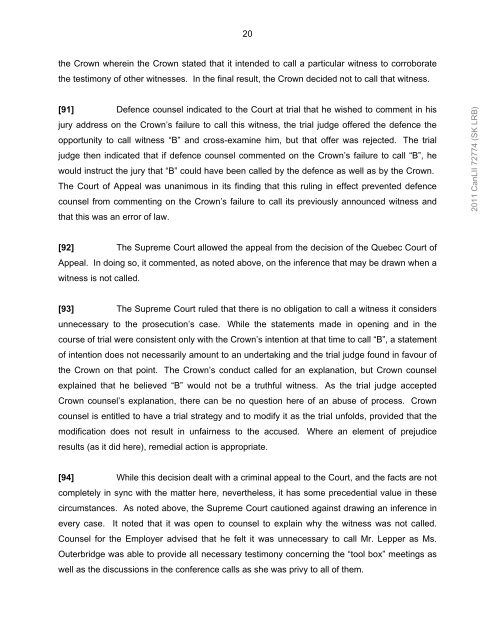FAQ's Cases - Stewart McKelvey
FAQ's Cases - Stewart McKelvey
FAQ's Cases - Stewart McKelvey
- No tags were found...
Create successful ePaper yourself
Turn your PDF publications into a flip-book with our unique Google optimized e-Paper software.
20the Crown wherein the Crown stated that it intended to call a particular witness to corroboratethe testimony of other witnesses. In the final result, the Crown decided not to call that witness.[91] Defence counsel indicated to the Court at trial that he wished to comment in hisjury address on the Crown’s failure to call this witness, the trial judge offered the defence theopportunity to call witness “B” and cross-examine him, but that offer was rejected. The trialjudge then indicated that if defence counsel commented on the Crown’s failure to call “B”, hewould instruct the jury that “B” could have been called by the defence as well as by the Crown.The Court of Appeal was unanimous in its finding that this ruling in effect prevented defencecounsel from commenting on the Crown’s failure to call its previously announced witness andthat this was an error of law.2011 CanLII 72774 (SK LRB)[92] The Supreme Court allowed the appeal from the decision of the Quebec Court ofAppeal. In doing so, it commented, as noted above, on the inference that may be drawn when awitness is not called.[93] The Supreme Court ruled that there is no obligation to call a witness it considersunnecessary to the prosecution’s case. While the statements made in opening and in thecourse of trial were consistent only with the Crown’s intention at that time to call “B”, a statementof intention does not necessarily amount to an undertaking and the trial judge found in favour ofthe Crown on that point. The Crown’s conduct called for an explanation, but Crown counselexplained that he believed “B” would not be a truthful witness. As the trial judge acceptedCrown counsel’s explanation, there can be no question here of an abuse of process. Crowncounsel is entitled to have a trial strategy and to modify it as the trial unfolds, provided that themodification does not result in unfairness to the accused. Where an element of prejudiceresults (as it did here), remedial action is appropriate.[94] While this decision dealt with a criminal appeal to the Court, and the facts are notcompletely in sync with the matter here, nevertheless, it has some precedential value in thesecircumstances. As noted above, the Supreme Court cautioned against drawing an inference inevery case. It noted that it was open to counsel to explain why the witness was not called.Counsel for the Employer advised that he felt it was unnecessary to call Mr. Lepper as Ms.Outerbridge was able to provide all necessary testimony concerning the “tool box” meetings aswell as the discussions in the conference calls as she was privy to all of them.
















